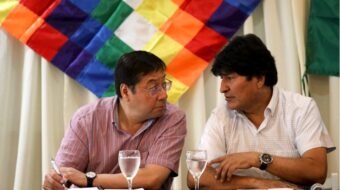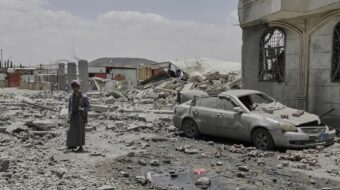
On Jan. 7, John Evan Ata Mills was sworn in as the new President of Ghana, the third since the country became a multiparty democracy in 1992. Mills and his party, the National Democratic Congress (NDC), swept elections last month, deemed free and fair by observers, and which solidified Ghana’s reputation as an African “success story.”
As importantly, Ghanaian voters repudiated neo-liberalism by booting out of office a right-wing party closely tied to George W. Bush’s administration.
A lawyer and former Vice President of Ghana, Mills calls himself a “social democrat” and embraces the politics and legacy of Kwame Nkrumah, the Marxist who led Ghana’s anti-colonial struggle and its first government after independence in 1957. Nkrumah, who advocated industrialization, social welfare programs, and solidarity with oppressed peoples, was ousted in a 1966 coup many believe was orchestrated by the CIA.
The outgoing New Patriotic Party (NPP), which ruled Ghana during the two presidential terms of John Kufuor, traces its lineage to the reactionary clique which overthrew Nkrumah. The NPP presided over the privatization of state assets including natural resources, the main revenue earner for most underdeveloped countries, after voluntarily agreeing to Ghana’s designation as a “Highly Indebted Poor Country” by the International Monetary Fund/World Bank.
Bush considered Kufuor one of his closest friends and the NPP returned the compliment by naming a planned highway in the Ghanaian capital of Accra after the disgraced American president. The Kufuor administration was so eager to please its ally in Washington that it hinted Ghana might be willing to host the headquarters of the infamous U.S. Africa Command (Africom) before a resounding public rejection of that idea forced a retreat.
While close relations with Bush’s regime may have been sufficient to alienate Ghanaian voters, the corruption and ineptitude of the NPP government coupled with the further impoverishment of ordinary Ghanaians turned public opinion against the ruling party. Over the past eight years, even though foreign-owned department stores and imported luxury cars were offered as evidence of prosperity by so-called development experts, the reality of “free market” economics was manifest in the multitude of homeless children hawking goods and begging on the streets of Accra. A final nail in the coffin of the NPP was the significant increase in crime linked to Ghana’s recent emergence as one of the major trans-shipment points of South American drugs to Europe.
All of this economic and social deterioration occurred under the watch of the NPP, a party cultivated and supported since at least the early 1990s by the U.S. government and one which came to power promising “development in freedom.” The hypocrisy of their rhetoric and that Ghana is blessed with abundant mineral and agricultural resources, and a soon to be exploited reserve of off-shore oil, led many ordinary Ghanaians to demand more state intervention to alleviate their suffering.
Newly-elected President Mills, affectionately known as “the Prof,” has promised to address people’s hardships by dedicating more state resources to health, education and poverty-eradication programs. The NDC has a history of delivering its promises, as Ghana became one of the most stable and relatively prosperous African nations under the leadership of the founder of the party, former President J. J. Rawlings. Mills served as vice-president during Rawlings’ second term, the constitutionally-mandated maximum for a Ghanaian head of state.
Although Mills won last month’s presidential run-off election only with a razor-thin 50.23 percent of the vote, that figure is misleading. He defeated his NPP rival in seven out of the ten regions of Ghana, representing nearly all of the ethnic groups in the remarkably diverse nation. Support for the NPP’s candidate was limited to his home and two ethnically-related regions, leading many commentators to conclude that the party has reverted to its “tribal” base while the NDC, in the tradition of Nkrumah and his Convention People’s Party, has re-claimed its position as the mass, national party of Ghana. Indeed, the NDC’s power base is amongst the urban poor and farmers in rural areas and who represent the overwhelming majority of Ghanaians.
The NPP seemed stunned by its defeat and acted as a sore loser, claiming its opponents committed fraud, allegations dismissed by the Election Commission since no evidence was offered. In fact, the only documented cases of rigging took place in the areas where the NPP candidate was victorious.
Despite the competitiveness and bitterness of the election season, Mills is determined to move forward and like Obama promises to bring people together to confront the many challenges facing his country. ‘I will be president for all Ghanaians, whether they voted for me or not. I’ll heal wounds and strive to ensure unity,” Mills declared at his swearing-in ceremony. And, again like his American counterpart, Mills’ first priority is to undo many of the last-minute, retrogressive measures enacted by his right-wing predecessor, such as a scandalous end-of-service benefits package for Kufuor which would cost the nation millions of dollars.
Indeed, the parallels between Mills and Obama were cultivated by Ghanaians who embraced hope and change as enthusiastically as the tens of millions of Americans who joined together to push their country in a new direction. A popular button worn by celebrants at Mills’ inauguration, photographed by news reporters and reprinted in newspapers around the world, features images of Mills and Obama beneath the words “God’s chosen presidents.”









